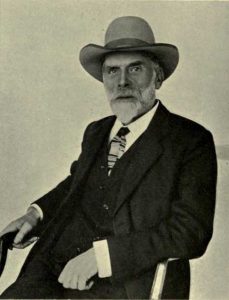
[Robert Bridges, from Poetical Works of Robert Bridges, Excluding the eight dramas. Henry Frowde / Oxford University Press, 1912—public domain, Wikimedia File:Robert Bridges 1912.jpg]
During the Middle Ages, Arabs, Moors, and Berbers captured many Christians and worked them as slaves or held them for ransom in North Africa. In 1415 the Portuguese captured the city of Ceuta, which for centuries gave them a toe-hold in North Africa. Robert Bridges, poet laureate of England from 1913 to 1930, made use of these historical facts in setting a blank-verse drama titled The Christian Captives. The story is a tragedy of thwarted love in five acts.
The desire of the King of Fez to regain Ceuta after the Portuguese invade Tangier is a central theme of the play. The Christian captives appear in the story as a chorus, introducing an Islamic princess to Christianity. They serve as a bargaining chip in negotiations between the Christians and the Muslims in an otherwise improbable tale.
Nonetheless, the captivity of Christians was real enough. Among the most famous captives of the sixteenth century was a Spaniard, Miguel de Cervantes, who was held five years despite several attempts to escape. Eventually his parents, with help of a religious organization, ransomed him and returned him home to write his famous novel, Don Quixote, the play The Dungeons of Algiers, and other works that mention captivity in Algiers.
